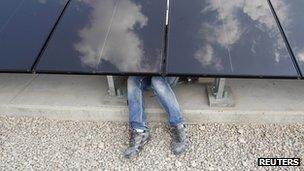Renewables 'help jobs and growth'
- Published

Employment may be among the hidden benefits of renewable technologies such as solar
The renewable energy industry supports 110,000 jobs in the UK and could support 400,000 by 2020, a report says.
The Renewable Energy Association (REA) and consultants Innovas conclude that the industry is worth £12.5bn per year to the UK economy.
Last week the European Commission said low-carbon generation and energy efficiency could generate five million jobs across the EU by 2020.
The report follows two opinion polls showing public support for renewables.
The REA says <link> <caption>its report</caption> <url href="http://www.r-e-a.net/news/report-on-employment-and-skills-in-the-uk-renewable-energy-sector-to-be-launched-with-greg-barker" platform="highweb"/> </link> , which will be formally launched on Tuesday, is the first comprehensive analysis of the economic and employment benefits of the UK industry.
"Harnessing our renewables creates employment, and means that rather than spending money on energy imports we can keep it circulating in the UK economy," said REA chief executive Gaynor Hartnell.
"When it comes to the employment, economic and energy challenges we face, the answer is clear - make it renewable, and make it in Britain."
The renewables sector grew by 11% between 2009/10 and 2010/11, compared with overall UK growth of just 1.4%.
The report also calculates that renewables generated exports of just under £1.6bn in 2010/11, with wind technologies the biggest contributor.
Seizing the momentum
The UK target is to supply 15% of total energy - not just electricity - from renewable sources by 2020, a goal that is likely to prove challenging.
Concern about the additional cost of renewable technologies has led to pressure within government, particularly from the Treasury, to boost gas generation - even though <link> <caption>that could prevent</caption> <url href="http://www.bbc.co.uk/news/science-environment-17423877" platform="highweb"/> </link> the UK reaching its long-term, legally binding targets on cutting greenhouse gas emissions.

Barack Obama has recently extolled the jobs angle of fossil fuels, though renewables could give more
But Climate Change Minister Greg Barker said the coalition was determined to push ahead with full deployment.
"Renewable energy not only provides us with clean and secure energy that cuts our reliance on imported fossil fuels - it generates billions of pounds of investment and potentially hundreds and thousands of jobs and is a key growth sector for the UK economy," he said.
"The REA's report sets out plainly the opportunities and challenges in this area. We are determined to seize the momentum and secure maximum benefit for the UK."
The analysts calculate that meeting the 2020 target will mean the country spending £60bn less on importing fossil fuels than it would otherwise, so providing a boost to UK coffers.
However, campaigners against renewables dispute whether the benefits will all be felt in the UK.
The new organisation National Opposition to Windfarms <link> <caption>cites cases</caption> <url href="http://www.nowind.org.uk/charter.html#5" platform="highweb"/> </link> where companies installing turbines in the UK have employed workers from other countries, diluting the benefit.
It also points to <link> <caption>European Commission economic modelling</caption> <url href="http://ec.europa.eu/energy/renewables/studies/doc/renewables/2009_employ_res_report.pdf" platform="highweb"/> </link> , published in 2009, concluding that the high cost of some renewables meant that some EU countries including the UK could see a negative impact on the economy and employment.
The report comes shortly before the UK hosts the Clean Energy Ministerial meeting, which brings ministers from 23 nations to London for two days of discussions on low-carbon energy and related topics.
In the last few days, <link> <caption>two opinion polls</caption> <url href="http://www.bbc.co.uk/news/science-environment-17783604" platform="highweb"/> </link> have demonstrated public backing for renewables.
A YouGov survey found 64% of UK adults (88% in Scotland) wanting renewables to provide the bulk of new generation capacity installed between now and 2020.
An Ipsos-Mori poll turned up a similarly sized majority in favour of wind power, and public backing for the current level of UK wind power subsidy (about 2p per day).
Follow Richard <link> <caption>on Twitter</caption> <url href="http://twitter.com/#!/BBCRBlack" platform="highweb"/> </link>
- Published23 April 2012
- Published8 April 2012
- Published27 March 2012